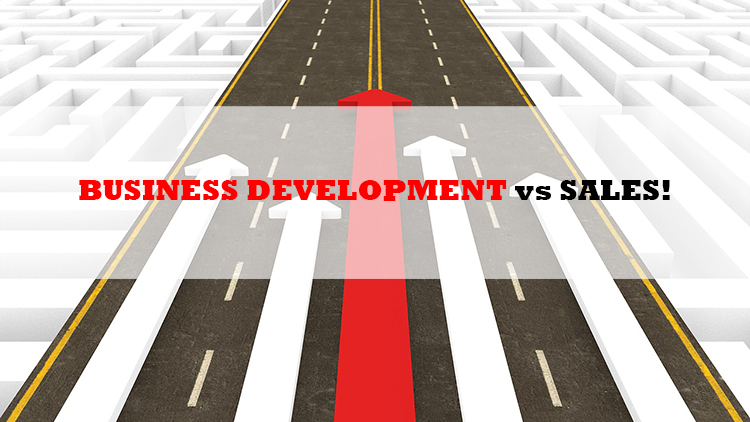The Misconception
There is a general false belief that Business Development and sales is one and the same thing. Although it may apply for small businesses where the business developer is the same person responsible for sales, they are actually very different business activities, fulfilling different purposes within a company. A Business Developer should not be confused with a Salesperson. The two roles are interconnected and depend on each other in order to grow the business, but there is also a clear division line between them.
I already talked about what it means to be a business developer in one of my previous posts. Now I´d like to point out why, when I do business development, I do not actually do Sales.
Find out what a Business Developer’s responsibilities are by reading: What does it mean to be a Business Developer?
What are the goals of a Business Developer?
Maximize Value
Business Development is also called a specialized sales role (Hubspot, May 2016). Your objective, as a biz dev, is to create and maximize value for your customer. Your primary goal as a BD is relational: prospect the market, find potential clients (or leads), but don´t sell directly and aggressively. This is when the sales professional comes in, to close the deal and finish off what you have started and developed. And this where one of the big differences between Business Development and Sales lies.
Research, Listen and Advise
Today’s business world is very competitive. Securing even the smallest share of the market requires a huge amount of hard and smart work, business intelligence and know-how. Your job as BD is to understand the market. It involves painstaking client research and gathering information on how your company´s products and services can fulfill needs and solve problems.
A successful business developer is a careful listener and communicator and puts the customer first. After listening to the prospective client´s needs, you can start educating them about how your company can satisfy those needs. At the same time consider how you can best adapt your product to meet those needs. In the process you position your brand, acquire new clients and take your business to the next level.
On the other hand, an Sales Person then brings the finishing touches by drafting contracts, offering samples of your product / service and generally taking care of all the practicalities.
Find Partners, Not End Customers
You very well know that when you partner up with another company, your business scales immensely. By selling to another company, you don´t sell to an end customer but to a variety of employees in that company.
Once you find these partners, develop a strong relationship with them, based on respect and trust. This in turn will build a long-term exchange of values. Building a strong network is sure to open many doors. A satisfied partner will definitely recommend you and your business to other businesses and will even follow you from job to job.
Opposed to this, a sales professional is a numbers person, which takes the work of the BD and turns into metrics and profit percentages.
Be Creative and Innovative
As a BD, you approach every business as a universe in itself. You need to show creativity not only help your clients but also differentiate yourself and your company´s products.
You should be trying to persuade and influence the decision-makers of a company, by using sharp negotiation skills to come to an agreement. Be easily approachable because this will make your prospects more open to you. Be friendly to your clients to attract them on your side. They´ll turn to you next time they need help with something.
Here the help of an original SP, who thinks effectively and breaks out of routine to help improve the business solutions generated by a BD, can come in very handy.
Look after your clients
You do not have a target quota to reach, while sales people do. They focus on hitting that target, while you need to go beyond that by looking after the client. Carefully ensure they are happy, in order to retain them. When a client knows this, trust and loyalty builds up from both sides. A happy client will leave positive referrals and this will generate ongoing business for your organization.
As a BD, the relationship to your client does not stop once you’ve managed to sell something; on the contrary, you need to have a long term view that once you’ve satisfied the first need. You need to look for other necessities they might have and go on to creatively solve those as well. By maintaining existing relationships, you´ll find it so much easier to upsell and cross-sell because your customers will want to invest in your products.
The sales professional need’s to be aware that the work you have started needs to be maintained by them as well. This way their pipeline is always full. A customer develops product and brand preferences over time and after consecutive positive experiences. So take the long-term business development road.
References:
Pollard, S (2012): ‘What Exactly is Business Development?‘ in Forbes Magazine;
Yazan Abu Al Rous: ‘What does it mean to be a Business Developer?‘.

It’s really interesting to go through the blogs that you have shared above. Alex Averhoff is a IT expert and CEO of the Direct I.T Staffing INC who provides the help you to achieve your goals even if you want a career change or are unsure about your job skills.
Thanks !LikeLike